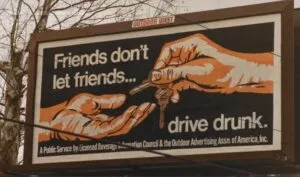 The 1970’s were a wild time in the history of drunk driving. At the end of the 1960’s there were over 25,000 drunk driving crashes in the United States, and as the 70’s began it seemed to be widely accepted that someone would just get behind the wheel drunk. That might be because there were few to no penalties, no one lost a driver’s license, and crashes were considered ‘accidents’ that no one really meant to cause.
The 1970’s were a wild time in the history of drunk driving. At the end of the 1960’s there were over 25,000 drunk driving crashes in the United States, and as the 70’s began it seemed to be widely accepted that someone would just get behind the wheel drunk. That might be because there were few to no penalties, no one lost a driver’s license, and crashes were considered ‘accidents’ that no one really meant to cause.
It was a lax way to look at drunk driving, and after a journalist named Doris Aiken read about a drunk driver who killed two teenagers in New York in 1977, she decided to question the local district attorney about it. When she found out that no one was going to jail and that the driver would get to keep his license, she took steps to create a much-needed change.
Aiken started by meeting with other people at her local church, and that’s where Remove Intoxicated Drivers (RID) was born. Begun in 1978, it was the first anti-drunk driving organization in the United States. As RID grew other activists jumped on board, and by 1983 there were 130 chapters in 30 states.
It was during RID’s growth stage that the most well known anti-drunk driving organization in the history of drunk driving began: Mothers Against Drunk Driving (MADD) formed in 1980 by Cindy Lamb and Candy Lightner. They’ve grown from a small organization to having at least one office in every state and one in every province in Canada.
With RID focusing its efforts in New York and MADD branching out all across the USA, real change began. Over a 30 year period the blood alcohol limit for drunk driving dropped across all states to .08, stiffer penalties became the norm for anyone caught drunk driving, and ignition interlock devices became the method MADD promotes as one of the best ways to stop drunk drivers.
Although the forty-year drop from 25,000 crashes to 10,000 crashes is significant, there’s still a lot of work to be done to get that number to zero. Thankfully organizations like RID and MADD are still out there working to end drunk driving, and with people like Aiken at the helm, they won’t stop until they do.